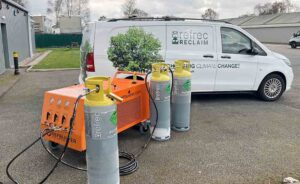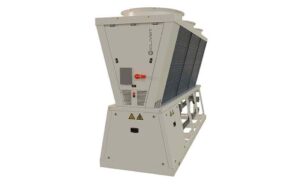Are ionic liquids the future?
28th October 2013
USA: A novel twist on the established vapour compression cycle could provide a non-toxic, non-flammable and energy efficient answer to the search for low GWP refrigeration and air conditioning systems.
When it comes to a potential low GWP alternative refrigerant, CO2 ticks all the boxes in terms of being non-toxic, non-flammable and highly efficient in the right application. However, it is not the universal solution. Its negative aspects include its high pressure, high discharge temperature and less than ideal efficiencies in high ambient temperatures. Plant costs are also high compared to other alternatives.
Research at a fairly advanced stage in the USA could change that and make CO2 the ideal refrigerant.
A group of scientists at the University of Notre Dame, Indiana, are now working on utilising novel ionic liquids – pure salts that are liquid at ambient temperatures – in tandem with CO2. Ionic liquids have previously been researched for use in absorption equipment but at Notre Dame they are working with the traditional vapour compression cycle – but with a twist.
According to the group, CO2 in combination with a custom ionic liquid is deployed inside the “co-fluid vapour compression cycle” using a conventional heat exchanger and expansion valve but with a specially designed compressor. It is here where the “wet compression” takes place, creating a chemical reaction between the CO2 and ionic fluid.
The resulting system is said to be hugely energy efficient and lowers the pressures associated with CO2 so there is no need to go transcritical. Potential COPs of up to 4.5 are theoretically possible for the new system.
The idea is not new. The co-fluid vapour compression cycle has been known for more than a century. It was most recently researched a decade ago using CO2 and other non-ideal, non-ionic liquid co-fluids. That research focused on car air conditioning systems, but the same regulatory pressures did not exist then and the project was ultimately shelved. Professor William F. Schneider, one of those involved in that work is now part of the Notre Dame team that includes Joan Brennecke, member of the USA’s National Academy of Engineering and recent recipient of the E V Murphree Award in Industrial and Engineering Chemistry from the American Chemical Society. Their combined experience with designing and synthesizing novel ionic liquids for new applications has resurrected the co-fluid vapour compression cycle to the point of commercial viability.
A start-up company – Ionic Research Technologies – has been created to commercialise the technology, the group is working with two other partners in its development.
According to Ionic Research Technologies president and ceo Doug Morrison, the system will have applications across the air conditioning and refrigeration spectrum. All resources are currently being put into developing stationary systems despite the technology’s past history with car ac and the current turmoil in that market for a suitable replacement for R134a.
“We are currently not working with car air conditioning but we do have aspirations to go there in the future,” said Doug Morrison.
Crucial to the technology’s success is the selection and production of our proprietary ionic liquids. Materials compatibility and toxicity tests have not found any problems so far and choice of lubricant may not be a problem – the ionic liquids might also be capable of performing that task.
Market tests are scheduled for next year with expected commercialisation in early 2015.
Subscribe to the Cooling Post newsletter







